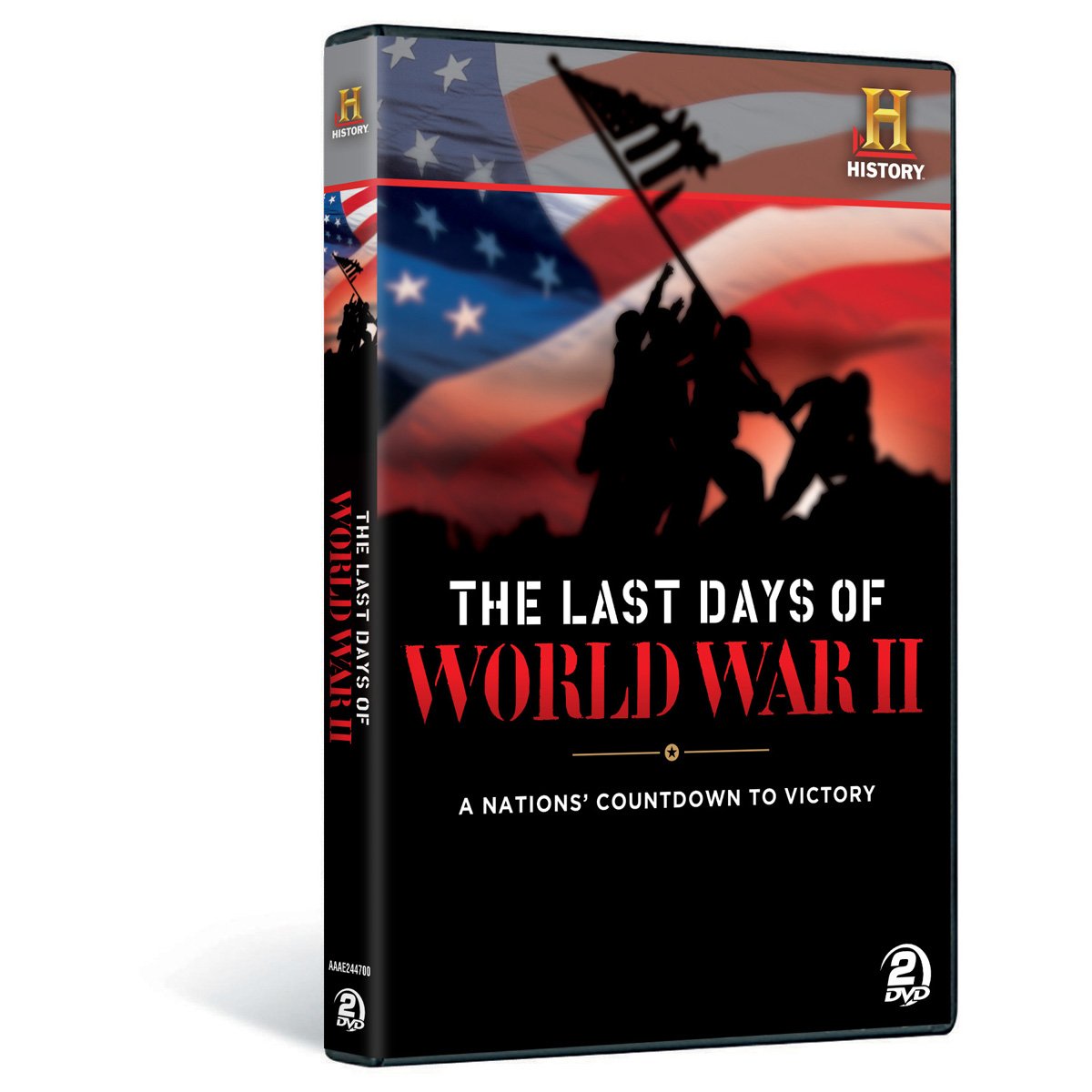A&E Last Days of World WAR II
$14.64
Price: $14.64
(as of Sep 09, 2025 12:13:56 UTC – Details)
The Last Days of WWII
The Last Days of WWII chronicles the unrelenting Allied advance through Europe that finally crushed Hitler’s Third Reich. First-hand footage and expert commentary follow the decisive ground battles and strategic bombing missions from D-Day through the capture of Berlin. It also examines the after-effects of the war, from the wrenching drama of the Nuremberg Trials to the revelations of the Nazis’ last, desperate acts, including their attempts to hide looted treasures and develop secret weapons. The Last Days of WWII would be useful for classes on European History, American History, Geography, Military History and Ethics. It is appropriate for middle school and high school.
Death of the Reich
In ten days of bloody fighting in the Ardennes forest, the fate of the war in Europe was sealed. The Battle of the Bulge left the Wehrmacht in tatters and the road to Berlin clear for the advancing British and American forces. For six months, the Germans staved off the inevitable, despite incessant bombing and the surrender of over a quarter of a million soldiers. But, by May of 1945, the Soviet flag flew over Berlin, Hitler was dead, and the war was over.
Vocabulary
• autopsy
• capitulation
• debacle
• decimated
• exploit
• fanatical
• goose step
• guerilla
• incendiary
• Luftwaffe
• paranoid
• Reich
• retrospect
• sabotage
• sniper
• vagabond
Discussion Questions
1. In war, “to the victor belong the spoils.” What are the spoils of war? What does this phrase mean?
2. In December 1944, Hitler moved the bulk of his forces from the eastern front to the western front. Why did Hitler do this? What did he hope to achieve?
3. The Battle of the Bulge was one of the decisive battles of WWII. Why did the Germans lose this battle? How did this loss contribute to the final outcome of WWII?
4. As the Red Army invaded Germany, it went on a rampage of destruction and looting. Why did the Red Army feel justified in the plunder of Germany?
5. Allied forces destroyed the city of Dresden, causing the death of over 100,000 civilians. Why did the Allied forces do this? What did they accomplish by killing civilians? Are there any rules in war about the conduct of armies?
6. When Berlin and Germany were about to fall to the Allied forces, Hitler insisted to the people of Germany that victory was in sight. Why did Hitler say this when it was obviously not true?
7. Every nation uses propaganda during wartime. What is propaganda? How do you recognize propaganda? What is the role of propaganda in wartime?
8. Hitler’s death camps killed over 10 million people. How was it possible that these camps were secret?
9. General Eisenhower insisted that the liberation of the death camps be photographed and witnessed. Why did he think this was so important? How did Eisenhower’s predictions come true?
10. Why did Hitler commit suicide?
Extended Activities
1. Imagine that you are a soldier during WWII. Write a letter home to your family describing the war and your experiences.
2. On a map of Europe, trace the path of the Allied invasion from Normandy to Berlin.
3. Create a timeline that chronicles the major events of WWII.
Justice at Nuremberg
In the months that followed the end of WWII, many horrific revelations came to light, but it was not until the Nuremberg trials that the full breadth of Nazi atrocities was revealed. Through 200 days of gripping testimony, the world watched as the inner workings of the Third Reich were exposed in the final accounting of Hitler’s crimes against humanity.
Vocabulary
• apathetic
• ascertain
• atrocities
• communiqué
• concessions
• dais
• degradation
• delegation
• eloquent
• fiasco
• genocide
• gregarious
• incongruous
• indictment
• jurisdiction
• malignant
• precarious
• refute
• succumb
Discussion Questions
1. The Allied forces insisted that Germany surrender unconditionally. What is meant by an unconditional surrender? Why did the Allied forces insist on an unconditional surrender?
2. WWII has been called both a war and a crime. Why was WWII a crime? How was it different than other wars?
3. The war crimes trials were held in Nuremberg. Why were they held there?
4. Twelve Nazi leaders were sentenced to death by hanging at the Nuremberg trials. The Nazi leaders pleaded for death by firing squad. Why did the method of execution matter so much to both the Nazis and their accusers?
5. Hermann Goering defied the Nuremberg judgement by committing suicide. How was he able to do this even though he was imprisoned and under constant surveillance?
6. Why did Goering’s suicide embarrass the United States Army?
7. The most obvious reason for the Nuremberg trials was to punish the men responsible for WWII atrocities. But the trials served another purpose. What was it? Why, in the scope of history, was this purpose more important than the fate of the accused men?
8. Was it just to execute the Nazi leaders? If so, why? If not, why not?
Extended Activities
1. Create a poster that celebrates the end of WWII.
2. Imagine that you are a journalist and you witness the liberation of a Nazi death camp. Write an article for your readers that conveys the impact of what you witnessed.
3. There are some people today who are trying to prove that the Holocaust never happened. How would you prove to these people that it did happen?
The Spoils of War
The German Army systematically looted every town it overcame in its sweep across Europe. By the end of the war, countless treasures had been hidden underground as a protection against air raids. The U.S. Army in its massive drive to collect and return stolen items recovered some riches, such as the Austrian crown jewels. But others were spirited away by the Russians as reparation for war damages. The German army also left behind valuable high-tech war machinery. From the V-2 missiles, the precursor to the rocket that would eventually take man to the moon, to the world’s first operational jet aircraft, the technology and scientists of the Third Reich would benefit the Allies for years to come.
Vocabulary
• Aerodynamics
• appropriations
• Chateau
• confiscate
• curator
• elation
• expedite
• Icons
• incredulous
• obviate
• Pillage
• portend
• propulsion
• reparations
• sporadic
• totalitarian
Discussion Questions
1. At the end of the war, General Eisenhower issued an order for American soldiers to protect historical monuments and cultural items. Why was this important to the U.S. Army and General Eisenhower?
2. Nazi leaders had a passion for collecting paintings and objects of art. How can this be reconciled with the Nazis’ heinous disregard for human life?
3. What was the job of the American Monuments, Fine Arts & Archives team?
4. The site of the recovered German gold reserves and art collections were in Russian occupied territory. Why did the U.S. remove these items under the cloak of secrecy?
5. The Nazi art collection consisted of art treasures from all over Europe. How did the Nazis acquire these treasures?
6. Art is a subjective medium. What makes an object or a painting art? How do you determine its value? Why are some creations deemed as art and others just as paintings, etc.?
7. The U.S. Army confiscated German planes at the end of the war. Why was the U.S. so interested in these planes?
8. How did the end of WWII portend the beginning of the Cold War?
Extended Activities
1. Divide the class in two and monitor a debate on the question of whether or not the U.S. was correct in returning confiscated art to Germany.
Is Discontinued By Manufacturer : No
MPAA rating : Unrated (Not Rated)
Package Dimensions : 7.7 x 5.4 x 1.3 inches; 8 ounces
Item model number : AAE-71191
Media Format : Black & White, Closed-captioned, Color, DVD, Dolby
Run time : 279 minutes
Release date : May 1, 2004
Studio : A&E Home Video
ASIN : B0001XARMW
Best Sellers Rank: #171,179 in Movies & TV (See Top 100 in Movies & TV) #2,566 in Military & War (Movies & TV)
Customer Reviews: 4.2 4.2 out of 5 stars 20 ratings var dpAcrHasRegisteredArcLinkClickAction; P.when(‘A’, ‘ready’).execute(function(A) { if (dpAcrHasRegisteredArcLinkClickAction !== true) { dpAcrHasRegisteredArcLinkClickAction = true; A.declarative( ‘acrLink-click-metrics’, ‘click’, { “allowLinkDefault”: true }, function (event) { if (window.ue) { ue.count(“acrLinkClickCount”, (ue.count(“acrLinkClickCount”) || 0) + 1); } } ); } }); P.when(‘A’, ‘cf’).execute(function(A) { A.declarative(‘acrStarsLink-click-metrics’, ‘click’, { “allowLinkDefault” : true }, function(event){ if(window.ue) { ue.count(“acrStarsLinkWithPopoverClickCount”, (ue.count(“acrStarsLinkWithPopoverClickCount”) || 0) + 1); } }); });









There are no reviews yet.